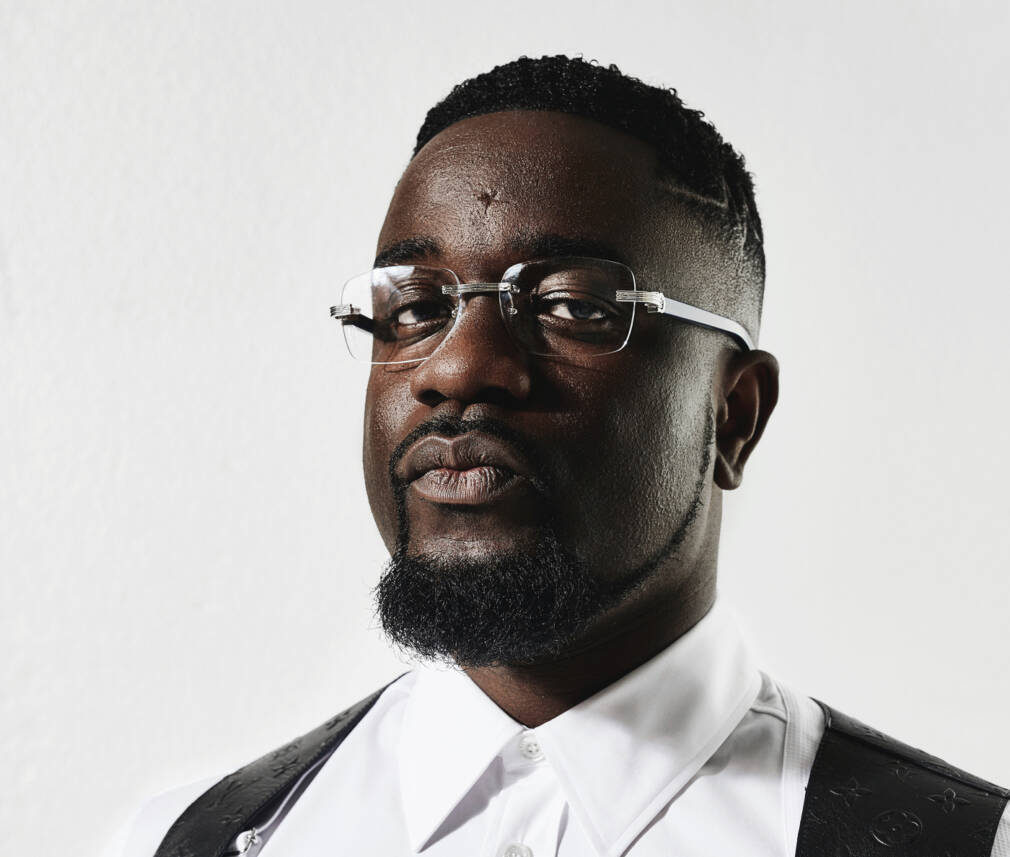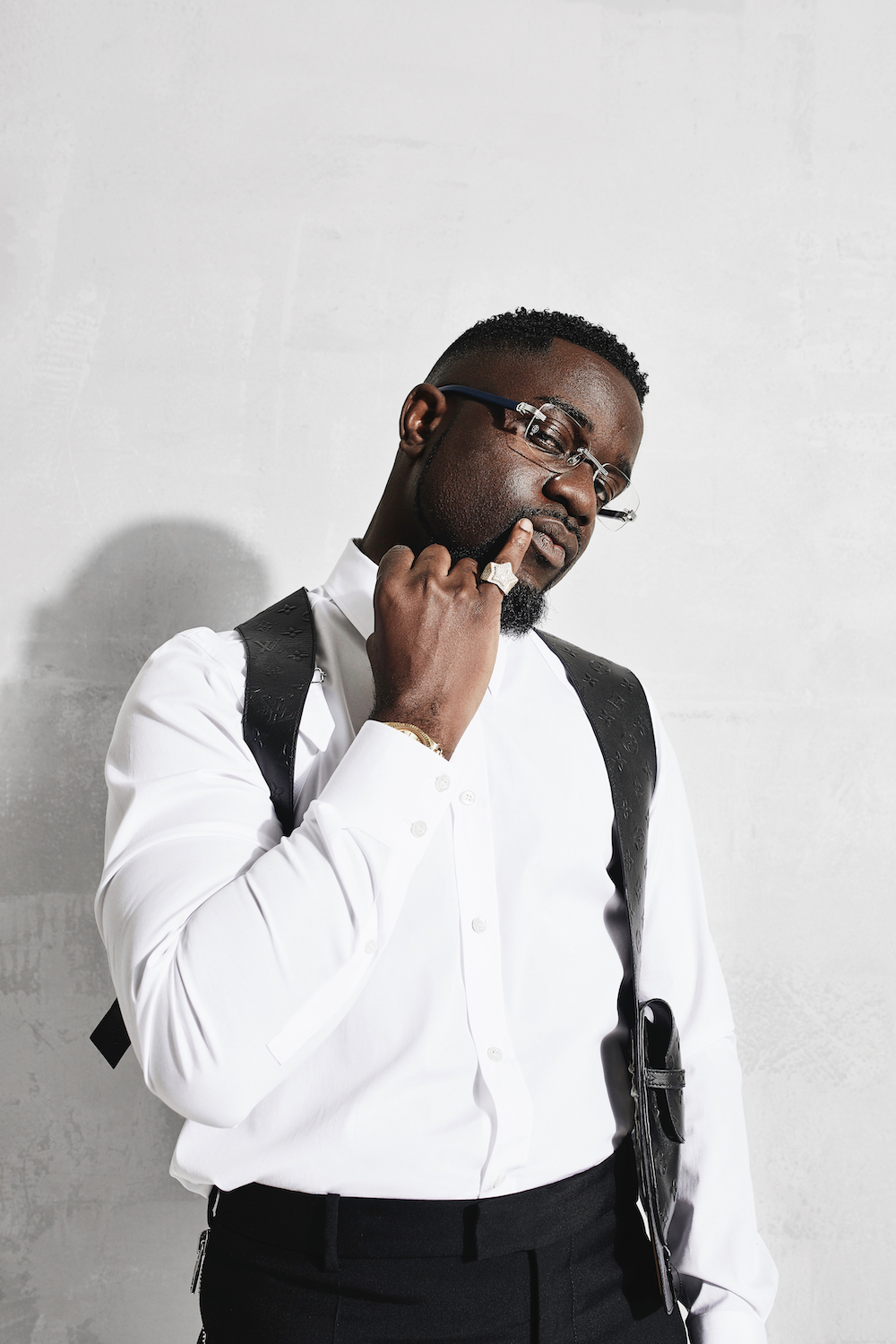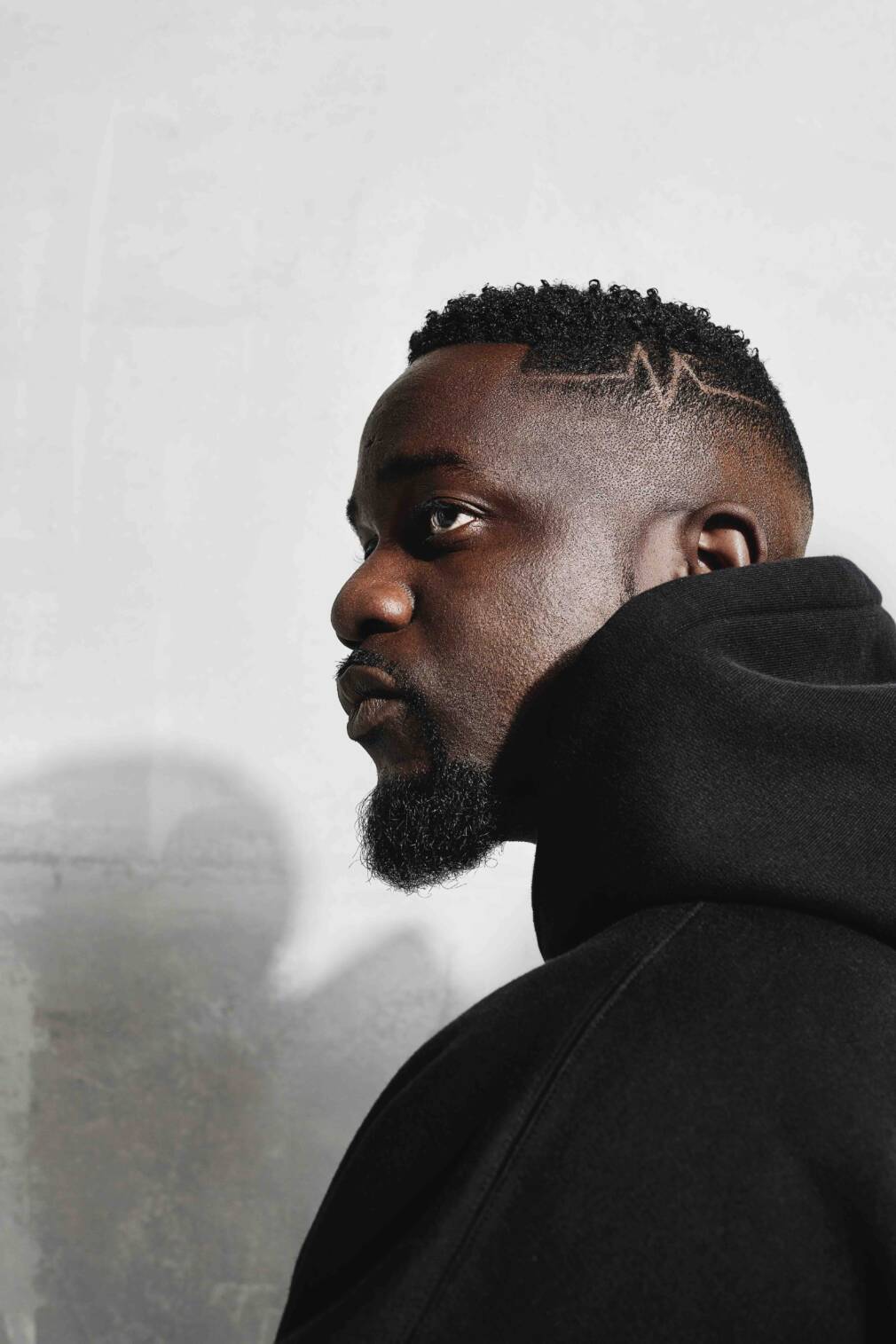The bright white decor complemented his mien comfortably. Sarkodie is seated inside his spacious mansion in Accra, sporting a laid-back demeanor. The aura from the 36-year-old Ghanaian rap royalty reminds of one American rap enigma Jermaine Cole: gracious, gentle, gingerly. If you are familiar with Zoomers lingo, then you could use the phrase: ‘It’s giving!’
In the litany of ‘givens’, one of the most iconic for the speed-rapping juggernaut is his recently-released collaboration with the reggae legend Bob Marley and The Wailers. Dubbed “Stir it up”, the record is the official lead single for an untitled compilation album by the estate of the late Bob Marley and the Wailers. Sautéed with fast-paced Twi bars, the 1973 classic revs back to life in the hard-hitting flows of the Ghanaian rap legend.
What “Stir it up” is doing for Sarkodie is much more than showcasing his brilliance to other music markets; it is actually a glaring reminder of Sarkodie’s musical foolproof – a mesh of raspy flows and indigenous lyricism that has coloured his artistry for nearly two decades. Sarkodie, who is a serial collaborator, might seem like the perfect rap candidate for this Caribbean-African union on “Stir it up”, but a delve into the discography of this Ghanaian-bred rapper and record executive prints a crisp portrait of a musical prodigy who consistently illuminates the African hip-hop scene with hit-laden albums.
Who is Sarkodie? Why should anyone even care about a speed-rapper who confidently amalgamates the best of pop, R&B, highlife and other commercially-appealing sonics into his projects? Why is he among the most celebrated and awarded rappers from a continent with 54 countries?
Becoming Sarkodie
Michael Addo is quite different from Sarkodie. “I am not walking around thinking about the fact that I am Sarkodie 24/7. I think of Michael, because I want to keep that. That is the most precious thing that every human being can have. You don’t want to lose yourself“, the rapper emphasizes. While Sarkodie is the bar-bender capturing hearts in Twi across the world, Michael Addo is the young man from Tema who dotes over family and wants to give back to society. Interestingly, the very rockstar-esque identity of Sarkodie is built over the solid foundation that is Michael Addo.
Beneath the macho gait and sharp gaze, Sarkodie is as human as it gets. His artistry is softened by his childhood experiences – part traumatic, part intriguing. And it reverberates in his music, even from his earliest hits such as “Mile 7 Saga”. Born and bred in Tema, the young rapper combed his observational nature and philosophies from a very core moment in life. Following his parents’ divorce, he was sent off by his father further south in the country, to a city called Koforidua, where he suffered maltreatment from a foster guardian that was paid to raise him. He was disconnected from his mother and he would spend a few years longing for her in letters he could not send, until fate reconnected them both. She regained custody of him when he was in junior high school and he moved back to the harbour city of Tema (home to R2Bees and Kwesi Arthur) where his life as a rapper took shape. He would later go to Accra to study graphic design at a training institute called IPMC. However, he preferred illustrating his stories with more bars than pixels. So, he moved across Ghana’s underground music community, gaining notoriety as a battle rapper.
Fortune found Sarkodie circa 2008/2009, when he won the popular Kasahare Level rap battle organised and aired by the Ghanaian broadcaster Adom FM. Stunned by his rhyming prowess, the show’s host, Duncan Williams, introduced Sarkodie to two prolific Ghanaian singers, Edem and Castro, who later introduced Sarkodie to a prominent producer called Hammer of The Last Two. This joy-ride of introductions netted Sarkodie two spots on Edem’s debut album, Volta Regime.
Sarkodie’s forthcoming ascent to the zenith of Ghana’s music scene became obvious when he released his official debut album, Makye, in 2009. Housing hits such as the Mugeez-assisted “Baby“, and “Borga“, among others, the record thrived with its shock appeal, putting Sarkodie on the continental radar of rappers on the rise. And in three years, the rapper proved his naysayers wrong, bagging numerous awards with Makye, and his 2012 sophomore, Rapperholic, including the Vodafone Ghana Music Awards, as the Best Artiste of the Year, et al, in 2010, and the Black Entertainment Awards (BET) awards, as the Best International Act, in 2012.
After 2012 came the azonto era, which marked a landmark era in African pop-culture, and Sarkodie’s 2013 “Azonto Fiesta” was among the leading songs that chaperoned this era. It was also the period when Afrobeats had been newly christened, in London, and the song helped significantly with the cultural exchange that would later become a propellant for West Africa’s current notoriety on the global stage. After seven albums, including his recently-released 10-tracker Jamz, two extended plays, and one collaborative album with Jayso, Sarkodie has consolidated his 18-year run with a library full of classics. And for him, becoming this “successful” is easier because he has mastered the art of balancing his personas as Sarkodie and Michael Addo. “I have no problem dealing with me being me.“

Jamz in Twi
One thing that sifts through any Sarkodie record is his catchy opening liner, ‘Obidiponbidi’, a Ghanaian moniker, that connotes a salutation for leaders or people of influence, in the Ghanaian Akan dialect. This expression, among his other popular expressions such as ‘You know sey money no be problem’, are active ingredients in Sarkodie’s lab experiments on fusing Ghanaian language with hip-hop music.
While many people doubted the potential of exporting hip-hop made dominantly in Twi, Sarkodie ran with the risk and with collaborations such as “Stir it up” it is evident that it was a risk worth taking.
“I want to be seen as somebody that people want to look up to. I like to lead. I don’t like to follow. So, that is what informed me pushing my native tongue. I think I can work on everything I want to do. I just have to put my mind to it. Funny enough, I started rapping dominantly, in English, before I switched to Twi. When I made my decision earlier on in my career that this is not the way I want to go (rapping in English), even if it was not going to take me to my next level. I want to go to the next level, but I also want to make history with it. This record proved to me that I was right.”
We sat silently, hearing each other breathe for a few seconds. The solemnity in his voice hung heavily in the room, and it was clear that authentic expression is at the heart of everything Sarkodie stands for.
The father-of-two is among the most acclaimed rap icons out of Africa. He is currently the first African rapper to have a released collaboration with Bob Marley. “This is Bob Marley! Who can they not get to do a verse? Everybody is going to rush to do it. They could get Jay Z, J Cole, Kendrick Lamar, or whoever they want.”
He also recalls having to deal with the pressure of meeting expectations on “Stir it up,” especially as he wrote his first verse mostly in English.
“They (Bob Marley’s estate) don’t expect you to come in and just sound like something they could have already easily got. I could recall that the first verse I sent to them had a lot of English in it, and they had to make it clear to me that the reason why they wanted me to rap on this song is because they want me to use my native language. All I had to do is just translate to them so they at least know one isn’t insulting Bob Marley or something. And they loved it.”
Sarkodie’s musical brilliance shines brightly in his native tongue, colouring his discography with a uniqueness that is more appealing to non-speakers than the discomfort of not understanding the lyrics. Music, afterall, is a universal language and with punchy bars, machine gun-paced flows, and pockets of phrases in English, Sarkodie has successfully resonated with different generations of music lovers, including non-Ghanaians.
Musical Mechanics
Sarkodie’s craftsmanship has survived several sonic shifts, including the current amapiano wave that is sweeping across Africa. Across the African music scene, different sounds lead the pop culture at any given moment, and since the late ‘90s/early 2000s, hip-hop and rap has not been one of them.
Rather than join the deluge of rappers struggling for breathing space on major music charts, Sarkodie’s game plan has consistently kept him ahead of the pack for years. With every album he releases, he scores at least one hit song, and the secret behind this success is simple: collaborations.
“I respect people who stay true to what they want to stay true to. If you are not limiting yourself from something that you can actually do. And then this is just what you like; you just want to rap; you don’t want to hear any commercial music, that is fine. I appreciate and understand every type of music. I think I have touched on almost every genre at this point in my career and I could get into anybody’s world.”
“I don’t know why you would want to limit yourself. Just try sounds. You just keep your core. Your fanbase wants you to rap which is okay but you have to still experiment, if you can. When people compare me to super successful African artists, sometimes I laugh because you are talking about people who sing and it is a compliment to me because I rap. But then, I could be in those conversations around successful artists. The reason is because I don’t limit myself to just rapping. I do music just as they do. So yes, I will encourage that. I have seen the benefits of that. There are certain people who would not know Sarkodie, until they listen to the Bob Marley record. But these are all reggae heads, they listen to conscious music. So maybe they know Sarkodie, but they don’t know really about what I do. So this is a good time for them to hear Sarkodie. Why would I miss out on reaching these ears?“
Away from the fact that Sarkodie has more collaborations with Pop/RnB singers than with other rappers, the most exciting part of his discography is that he spearheads the A&R process that results in these collaborations.
In his latest record, Jamz, Sarkodie tows familiar paths of balancing mellow pop with slow raps like in the Cina Soul-assisted “Over Me” or high-pitched club bangers with raspy flows like in the King Promise-assisted song, “Labadi.” The result is a 10-tracker album, which joins its predecessors No Pressure (2021), Black is Love (2019), Sarkology (2014), among others, as an exquisite rap record shipped across the world in a pop-driven vessel.
“Yeah, Jamz is my latest album, and one of my albums that I really like. I think throughout my career, everybody who has been a Sarkodie fan knows that I love love. I actually celebrate love. I’m really drawn to that. So, in my whole career, I have had a lot of great, sweet melody type of songs. However, it’s only one of my albums that is kinda similar to this. It is called Black Love, which is dominated by commercial and beautiful melodies. And Jamz is just a version of that, but more super commercial and more international sounds on there.

“It was inspired by just me taking time off and just enjoying my life in these beautiful places. I carried strong memories from these places back home in Ghana. So, when I was writing, it creeped into my head. I think about the soundtracks to those places that I went to. I went to Zanzibar, Mauritius, and many other places with beautiful scenery. And here in Ghana, I went to The Moon, in the Western Region. I was also inspired by the amapiano movement. I started talking to producers and they know that I hate flat commercial music. I won’t put anybody’s music on blast. In fact, let me use my own music. A song like “Confam” does not necessarily have soul, but it is a vibe. If you let me dictate the type of songs I like, I always like mood music that makes you feel something.“
“So, melody has always been a part of me. Even in hip-hop, sometimes I like when you have melodies in them. So, yeah, I just gave the guidelines to the producers. I wanted sweet melodies so I could have great vocals. The drums had to favor me too, since I had to rap. So that’s how calm we created the sound. We called it the playlist because I imagine Jamz being on rotation by one DJ on the radio that you don’t skip. So that’s what the project is really about. Normally, I would have one type of those records and maybe the rest of the album dominated by hip-hop. But this is a super commercial album in which every track will have a single-worthy approach.”
He attests to his “good ear for sound” as the piston behind his picks for the duets on the album.
“I think maybe in the future, when I am done and not actively recording, I want to get used to just putting music together because I would know who and who would sound well on a record. I am a big fan of music, despite being a musician professionally. I love music and I know what type of hook goes with what bassline, and which voice would sound good on a song like this. I just did a record on – and this is exclusive to you – Ajebo Hustlers. It was yesterday, or two days ago. I really mess with their music. Like I am the biggest fan of their music, because it is so distinct. As soon as I hear their voice, I notice.”
“So, when I send songs to a lot of people, a few times they might want to try something else. However, most of the time, I know what I have in my head is going to work and it does. So, I am very good with my ear. I bring the best out of people. Even if they have not tried it, I know they are going to sound good on it. So, with collaborations, it comes easier for me. Most of the records that you hear on Jamz, none of them involved me having a hard time selecting a beat for it. For instance, with Oxlade on “She Bad,” it was the first beat I sent to him, I knew it was him that could shine most on that beat. On “Labadi” with King Promise, I knew it was him too. I had “Country Side,” months earlier, knowing that this song was best suited for Black Sherif. But when he came, I just wanted him to just hear other stuff to see if he was going to have any other ideas. And I realized that it was stressing him out. So, I played the beat I had reserved for him, and 10 minutes after he heard it, he had the hook for the song.”
How The Story Ends
It’s not looking like it will end anytime soon, Sarkodie announces. With more albums and accolades than most of his peers, the Ghanaian rap prodigy is still looking to make more music. And there’s more: he wants to pump up the impact.
“I am an artist. So, every year, there is always music being done. I am definitely coming outside this year, I am doing a tour. I will be announcing like any moment from now. Also, basically I just want to be able to give back to the industry. And what made me Sarkodie. Having a hit song, at this point, is not my biggest high. Even with the Bob Marley collaboration, it is a high for me, but to be very honest it goes beyond just the music. There is a lot more that I can do. With all these years accumulated and the experience I have had, I need to give back to the industry in any form from having conversations with the young ones coming up or building structures that we need. I have been trying to bring these corporate investors on board, to see how we can properly create something impactful. This is where my state of mind has been for a minute now” he says.
For Sarkodie, the A&R whiz, rapper, songwriter and record executive, music represents his most important outlet for expression. His entire life is warped around this sonic therapy, despite having to create “jams” that resonate with the times. Yet, the rapper has a niche of his own – mood music stewed in aspirational lyricism.
“I would say all of my favorite records are very motivational, given the type of person I am. That is my core. If you allow me, I mean if you want to see my energy in physical form or just to see what my energy represents, it’s more of motivation and inspiration form. First will be “Hope”, the song featuring Obrafour. I will definitely take “Lucky” featuring Rudeboy. “Anadwo” featuring King Promise. I will put in “Better Days” featuring BNXN. Then “Glory” featuring Yung L. I barely listen to the songs that I have released. I listen to songs that I am about to release. When I go back to these songs I have mentioned to you, I can listen to them like I am listening to someone else’s song.”
And it is easy to guess why such music remains the apple of Sarkodie’s eyes, and ears. For the legacy-driven artist, music-making has gone beyond the commerce of demand and supply; it is his way of sharing emotions, and making it easier for other young people to be encouraged to do the same. For Sarkodie, success means more than profiting off music, it is in seeing his music inspire others, and like he did with Bob Marley, stir people back to life.





